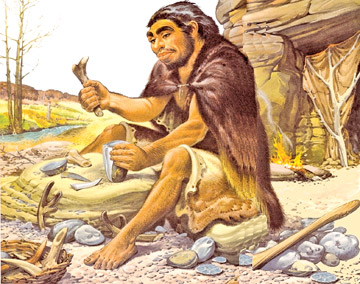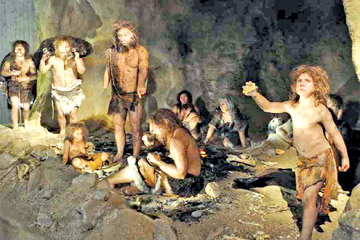Hunter-gatherer myth and Starchivores
by Daya Dissanayake
Hunter-gatherer is one of the biggest myths promoted by western
scholars. In the beginning man would have been a vegetarian. In the
Agganna Sutta man first feasted on the 'savoury earth' and later on
rice. There is no mention of the consumption of animal flesh'
|

Neanderthals |
"Also, to every beast of the earth, to every bird of the air, and to
everything that creeps on the earth, in which there is life, I have
given every green herb for food"; and it was so." Genesis 1:30
"Starchivores" is how Dr. Nathaniel Dominy, called our ancestors.
"Hunter-gatherers, the majority of their calories come from plant
foods...meat is just too unpredictable." Dr. Dominy had been studying
the bones, teeth and genetics of primates for his entire career as a
biological anthropologist.
Evolution
Man in his early stages of evolution would have been essentially a
herbivore. Anthropologists have tried to perpetuate the myth of the
meat-eating humans and of hunters. There probably could have been two
reasons to continue to maintain this myth.
One reason could have been the other myth, that man had always been
the dominant sex among the early humans, and that he was the provider.
It would have been inconceivable for the 19th century anthropologists to
accept that the woman would have been the provider.
When the early humans led a free and happy life, they would have
plucked a ripe fruit or a few tender leaves when they felt hungry. The
man would not have been expecting a cup of 'bed tea', then breakfast,
lunch, afternoon tea and dinner, served faithfully by a woman. Today we
have got used to needing all this out of habit.
There would have been plenty of food, fresh food, not only for the
humans, but for all the animals around them. When the food sources began
to dry up they could always move to a fresh habitat, without any
hesitation. They had nothing to carry with them, because they did not
need any material goods. Anything they needed was always at hand.
They did not have any need to possess anything, to be called their
own. They knew that everything on Mother earth belonged to all life and
they respected it.
Edible tubers
In addition to the fruit and nuts, they would also have consumed the
edible tubers. To dig up the tubers, they would have used a stick,
snapped of a tree. It was this digging stick that our anthropologists
identified as a weapon to kill animals, the pointed fragment of wood
found in Clacton-on-the-Sea in England. "It has been interpreted by most
scholars as a deliberately fashioned spear point, but it could equally
well be the fragment of a 300,000 year old digging stick".
A digging stick would have been used by a woman, and probably made by
her, not to kill animals, but to dig up a tuber.
We have always jumped to conclusions. When the two-metre tall
flightless bird 'gastornis' was found, because of its enormous beak, it
was named the 'terror bird' who snapped the neck of mammalian prey.
 The creatures had lived in Europe between 40 and 55 million years
ago. Dr. Thomas Tutken of the University of Bonn, believes that the
animal was not a carnivore, but lived on plant material, based on the
studies of the bones found recently. The creatures had lived in Europe between 40 and 55 million years
ago. Dr. Thomas Tutken of the University of Bonn, believes that the
animal was not a carnivore, but lived on plant material, based on the
studies of the bones found recently.
Why should any sane person try to eat decaying foul smelling raw
flesh of a dead animal, when there was so much fresh, sweet scented
plant material available all around them.
Nourishment
One more point raised by our scientists is that man needed meat for
the growth and nourishment of the brain. They were assuming that meat
was the best and only source of protein. Pumpkin Seeds can provide
practically the same amount of protein as beef. The protein in seeds is
also much more easily broken down and digested within the body. Besides,
pumpkin seeds actually lower cholesterol, instead of raising it.
The myth about needing meat for brain development has been proven by
the people in India, who have been vegetarians for several thousand
years.
Another myth of needing to eat fish to get the omega-3s (ALA or
EPA+DHA) needed by our body, has been debunked by a research group led
by Ailsa Welch at the University of East Anglia. Their conclusion was
that "the bodies of vegetarians and other non-fish eaters can respond to
a lack of dietary omega-3 EPA and DHA by increasing their ability to
make them from omega-3 ALA.
We could also arrive at the conclusion that in the early days the
human body could make omega-3 EPA and DHA from their food sources, but
later the bodies ability to make it declined as man began to consume
fish.
Katharine Milton wrote that there is general agreement that the
ancestral line (Hominoidea) giving rise to humans was strongly
herbivorous. "Modern human nutritional requirements feature in the
modern human gut, and the modern human pattern of digestive kinetics
(similar to that of great apes), suggest an ancestral past in which
tropical plant foods formed the basis of the daily diet, with perhaps
some opportunistic intake of animal matter.....humans come from an
ancestral range in which plant foods traditionally have served as the
primary source of energy." (Milton, Katharine. Hunter-gatherer Diets: A
Different Perspective.)
Grass eaters
Amanda G. Henry of the Max Planck Institute of Evolutionary
Anthropology and her team published their research findings on the
dietary pattern of Australopithecus sediba, discovered in the Malapa
Caves, Johannesburg. These two million years old prehuman species,
apparently lived almost exclusively on a diet of leaves, fruits, wood
and bark.
"One thing people probably don't realise is that humans are basically
grass eaters.
We eat grass in the form of the grains we use to make breads,
noodles, cereals and beers, and we eat animals that eat grass." Dr.
Benjamin H. Passey (John Hopkins University)
Even the Neanderthals - who lived about 200,000 to 40,000 years ago)
had eaten a variety of plant foods; starch grains have been found on
their teeth.
If early man preferred meat to plant food, why did they turn to
agriculture, which has been called the worst mistake made by man? |

